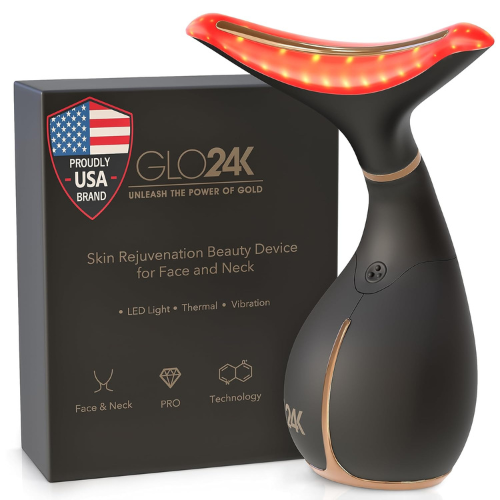Discover how skin-tightening massagers are reshaping the way we think about beauty. Is it the secret to smoother skin and a youthful glow?
Skin-tightening massagers have infiltrated every corner of our digital lives. They pop up on social media feeds, glistening under the endorsements of top influencers.
But why are these beauty devices taking the world by storm? Why are we so drawn to them? Let’s look into the appeal of skin-tightening massagers.
Heads up, gorgeous. Some links you see here are affiliate links. If you click and buy something, I might get a coffee (or two) out of it. The price stays the same for you, promise.
How Is Beauty Tech Transforming Self-Care and Aesthetics?
Technology has invaded every aspect of our lives, including self-care. The skin-tightening massager is one example. It stands at the edge of this shift. A part of beauty tech, it promises the same results as a salon, but without leaving your home. Ten years ago, you’d have laughed if someone mentioned it. Now, it’s a billion-dollar business. Foreo and NuDerma lead the way, selling the idea that we can do everything from our living rooms.
Personalized beauty devices are quickly becoming one of the most popular trends in the wellness industry. Why? Because people crave control. Whether it’s through microcurrents or LED light therapy, these tools promise something we all want—results tailored to us.
But it’s not about vanity. During the pandemic, many of us traded our regular spa visits for DIY routines. Beauty gadgets filled that gap. They transformed skincare into a meditative ritual. There’s something satisfying about rolling a device over your jawline while bingeing The Crown. It feels productive, even when it’s not.
And yet, I can’t help but wonder—are we outsourcing our confidence to machines? A skin-tightening massager might give my cheekbones a temporary lift, but does it make me feel better? Maybe the answer lies somewhere between a tech-enabled glow and the occasional side-eye to the mirror.
What Drives the Popularity of Skin Tightening Massagers?
I’m hooked by the promise of quick fixes. And I’m not alone. Our society thrives on instant gratification. We want results now. Preferably yesterday, with as little effort as possible. The skin-tightening massager is a device that seems to check all the boxes.

The GLO24K device, made with everyone in mind, works on both face and neck. You might get disappointed if you’re looking for a quick fix. Think of it as a long game—an investment in tomorrow’s skin. Depending on your skin type, it might even double as a preventative measure.
When we’re balancing Zoom calls, deadlines, and the occasional existential crisis, who can afford to commit to a 12-step skincare routine? The promise of a small, high-tech gadget to lift and firm while you scroll through Instagram is irresistible. It’s easy. It’s convenient. And it feels like progress, even if the results are subtle (or sometimes imaginary).
There’s also something deeper going on here: comparison. We live in a time when everyone’s face is a filtered masterpiece. Social media, with its curated perfection, has turned beauty into a performance. For career-driven women like us, who are already trying to be enough in so many ways, looking polished has become another item on the to-do list.
A glowing, firm complexion is now shorthand for “I have my life together.”
Psychologists call this “the halo effect.” If we look good, people assume we’re competent, successful, and—ironically—relaxed. It’s no wonder we’re drawn to tools that promise a shortcut to that glow. The skin-tightening massager is a symbol of hope. A tiny, buzzing beacon whispering, “You can have it all.”
Are Skin Tightening Massagers a Revolution for Skin Health?
The first time I saw a skin-tightening massager, it looked like something from a sci-fi movie—sleek, glowing, and strong. But I’m skeptical. Always have been. I wanted to know if these gadgets work or just another shiny object in the endless beauty tech carousel.
Let’s start with the benefits.
Studies show that the vibrations and heat from these devices help increase blood flow—a process known as microcirculation. More circulation means more oxygen and nutrients reaching the skin, which, in theory, could make it healthier. Some devices claim to stimulate collagen production. Collagen, as you might know, is the skin’s secret sauce—it keeps everything smooth and plump. Research shows that certain technologies, like radiofrequency, can encourage collagen synthesis.
But here’s the other side of the coin. Dermatologists warn about overuse. Too much heat or pressure can irritate the skin, especially if you’re prone to sensitivity. I’ve read stories of people going too hard and ending up with redness or broken capillaries. Ouch. It’s like trying to outsmart a frying pan—you’ll only get burned.
So, are skin-tightening massagers revolutionary? Maybe. But like any revolution, there’s risk involved.
How Does Pop Culture Shape Our Views on Beauty Tech?
Pop culture has a weird way of selling us dreams. Celebrities are the architects of a world that feels ambitious yet attainable. They make us believe everything is within reach if we try hard enough. Whether Kim talks about her love for LED masks or Kylie gushes about her obsession with the latest skincare gadget, they create an illusion that these technologies can solve your problem.
Their voices echo across our social feeds, encouraging us to believe that beauty tech isn’t just for the wealthy—it’s for the everyday woman who needs a little more time and the right gadget. Of course, that gadget, often promoted in glowing, overly-filtered videos, is more than a tool. It becomes a symbol—a shortcut to an idealized version of beauty.
What’s interesting is that we don’t just passively consume this media. We internalize it. We tend to measure ourselves against the people we admire. It’s almost instinctive. When we see celebrities using something, we immediately believe it must be indispensable, something we should have. And with skin-tightening massagers and similar devices, it’s as if the boundary between needing and wanting has blurred. The Kardashians swear by it, so you should give it a try.
But here’s the irony. In literature, the pursuit of beauty often comes with consequences. Think of The Picture of Dorian Gray, where obsession with youth leads to moral decay. Pop culture doesn’t warn us about the potential downsides. Instead, it focuses on the rewards: glowing skin, endless selfies, and, of course, the promise that we’ll always look “fresh” in a world that demands perfection.
The media and pop culture help us believe these tools are less about self-care and more about chasing an ever-moving target. And that’s what keeps us coming back for more.
Are Skin Tightening Massagers Reinforcing Unrealistic Beauty Standards?
Skin tightening massagers are marketed as this magical solution to our skin’s natural aging process. But when did we start thinking that smoother, firmer skin was the only thing standing between us and success? And why is this obsession so pervasive?
In our digital world, everything is filtered. On Instagram, we scroll through flawless faces, glowing skin, and smooth, wrinkle-free necks. It’s easy to fall into the trap of thinking these airbrushed moments are the real standard. We compare ourselves to an ideal that doesn’t even exist. It’s not that the technology behind beauty products is bad—it’s that how they are marketed often fuels this fantasy.
In “The Beauty Myth,” Naomi Wolf discusses how society created an image of womanhood defined by physical appearance. This image isn’t real, yet we chase it as though it’s the only path to happiness and success. Skin-tightening massagers promise to take us one step closer to that myth. But when we rely on these tools for self-worth, we reinforce the same superficial ideals that Wolf warned us about.
We must ask ourselves: Is flawless skin the answer to feeling whole, or another layer of societal pressure in disguise?
How Are Behavioral Economics Shaping Our Skincare Purchases?
Skin-tightening massagers and similar products are not just marketed to us as beauty tools. They’re positioned as solutions to the very pressures we face daily.
Have you noticed how these massagers are always part of limited-time offers?
Scarcity and exclusivity play on our instincts. We’ve been conditioned to act quickly when we feel something might slip away. Even when we don’t need it, even when the item in question is more of a fleeting want than a genuine need.
I’ve fallen for it myself. The ad pops up, telling me I’m just one click away from flawless skin. The countdown timer begins. It’s almost like they know I’ve been thinking about how much I need a “quick fix” for my tired face.
Then there’s social proof. Ads tell us that “everyone” is using these devices. So, we tell ourselves, “They’re doing it, so I should, too.” It’s strange how we want to stand out, but tend to follow the crowd. When we see the good results on others, we’re more likely to hop on the bandwagon.
Social proof is the power of seeing others do something and deciding it must be worth doing. If influencers rave and your friends buy skin-tightening massagers you wonder if you need one too. It’s not logic—it’s the human need to belong

These tactics are clever marketing. They play into our deep-seated psychological triggers. We feel the need to grab something because we fear losing out on a supposed opportunity. It’s as if our brains are trained to make choices driven by urgency, not reason. And before we even stop to think, we’ve bought into the notion that a skin-tightening massager is just the next logical step toward perfection.
What Does the Future Hold for Beauty Tech?
So what’s next for beauty tech? It’s hard to say, though I suspect we’re only just getting started. Right now, we’ve got skin-tightening massagers—little gadgets that hum and promise smoother skin, a touch more youth in the mirror. But where does it all lead? The possibilities feel endless, thrilling even.
Global markets are already showing some interesting variations. In Asia, beauty tech is practically a way of life. Skincare devices are seen as necessities rather than luxuries, and beauty rituals are intertwined with technology in ways many Western countries haven’t quite embraced yet. Meanwhile, here, we’re still trying to figure out whether a face mask will change our lives.
Looking to the future, though, there’s something revolutionary on the horizon. AI-driven skincare solutions are already popping up. Imagine a machine that analyzes your skin’s specific needs—picking up on changes in hydration, fine lines, or skin tone. It can recommend products and adjust your regimen in real-time. Sounds like something from a sci-fi movie, right? But it’s happening, and it’s not as far off as you think.
Then there’s the idea of virtual try-ons. Have you ever tried on a lipstick shade digitally? It’s about to get a lot more personal. Beauty brands are already experimenting with virtual consultations, letting you “try” products without stepping foot into a store. The busy, modern woman could be getting her skincare routine customized with a tap of a screen. Convenience is the name of the game now. We want results, but we also want to live our lives. Technology gets that.
So, will beauty tech solve all our problems? Probably not. But it might just make us feel less frazzled while we tackle them. The future of beauty tech isn’t about perfection. It’s about finding ways to make our busy, demanding lives a bit smoother.
Conclusion
Skin-tightening massagers have become the latest craze, offering us the illusion of control over our appearance. And let’s be honest, who doesn’t want help when the mirror isn’t cooperating? But is the desire for instant results clouding our understanding of beauty? Perhaps.
The research shows that these devices can work wonders—temporarily. They might boost collagen production or stimulate circulation. But the real question is: Are we looking for real, lasting change, or just the next shiny thing to smooth over our insecurities? And more importantly, what does this constant striving do to our mental well-being?
As modern women, we juggle a lot. We’ve got careers, relationships, side projects, and, yes, skin-tightening gadgets. We’re in a constant dance of trying to keep everything under control. But maybe it’s time to pause and ask: Does all this beauty tech help us feel better about ourselves? Or are we getting lost in the chase for perfection?
To quote Audrey Hepburn: “The beauty of a woman is not in a facial mode but the true beauty in a woman is reflected in her soul.” Beauty starts from within. So if you’re looking for balance, check out my article The Perfect Morning Routine for a Happy Heart—because beauty, like peace, comes from the inside out.
